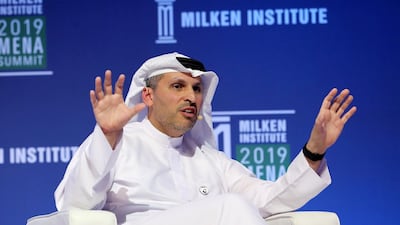Abu Dhabi's Mubadala Investment Company, which manages more than $220 billion (Dh832bn) of assets, outlined its strategy on Tuesday to further diversify its investments at home and overseas.
At the Milken Institute Mena Summit, organised by the US-based research firm in Abu Dhabi, Khaldoon Al Mubarak, chief executive of Mubadala, said the company has evolved over the years by partnering with third party investors and venturing into new sectors to drive long-term, sustainable returns.
“Mubadala has changed a lot over the years and we have a big responsibility,” he told the summit. “We are managing the future funds of the nation.”
In the past decade, Mubadala has launched operations in the aerospace manufacturing and engineering sector through its subsidiary Strata Manufacturing, and in telecoms and communications through Yahsat, its fast-growing satellite company.
Emirates Global Aluminium, in which it has a stake, has helped propel the UAE’s aluminium industry into a global operator.
The firm will continue to partner with investors to help grow its portfolio, which has expanded more recently to include the technology, agriculture and biotechnology industries, the chief executive said. “We have truly over the last 15 years become a global player and built a track record by partnering...with the best in class.”
Mubadala will continue to look outside the UAE for new prospective investments, he said.
“Given our size, we can’t concentrate investments in the UAE. Eighty per cent of our investments are international and, at the end of day, our economy cannot handle this size of investment,” he added.
Two years ago, Mubadala decided to further diversify by managing funds on behalf of third party investors. One way it is doing this is through its technology-focused venture capital arm, Mubadala Ventures. It was set up to oversee its parent company’s $15bn commitment to Japan’s $100bn SoftBank Vision Fund and aims to grow its portfolio to about $1bn by 2021.
In 2018, the Abu Dhabi government consolidated another state investment vehicle, Abu Dhabi Investment Council, with Mubadala, doubling assets from around $125bn previously. “As an investor, we have evolved,” Mr Al Mubarak said. “We are not only managing the sovereign wealth fund, we are also managing other funds.”
In an earlier session, some of the region’s biggest investors cited global trends such as the rise of populism, trade disputes and the advancement of artificial intelligence and other technologies as the main disruptors of political and business certainty.
“When you start getting involved in [AI and automation], you see that in reality it’s pretty scary stuff,” said Dubai businessman Mohamed Alabbar, the founder of real estate developer Emaar Properties and, more recently, UAE e-commerce platform Noon.com. “These smartphones can control your life, yet, at the same time, every single sector of the economy is going to go digital and if you don’t, you’re dead.”
“People in e-commerce, they are killing each other to control data, control price and control markets. I went into it because I want to defend my business against the global giants, and without a digital operation you could easily lose 50 per cent of your value,” he added.
However, Thomas Barrack, founder of US-based private equity investor Colony Capital, said that as more and more people pour into the race to digitalise, “just as many opportunities will arise the other way”, to re-connect people in the real world.
Mr Alabbar also spoke of Saudi Arabia’s Vision 2030 economic reform plan, which aims to modernise and diversify the economy through legislative and social change. The changes are bringing about short-term pain to businesses operating in the kingdom, he said, but they are “necessary, healthy changes”.
“Bold action is required for bold places,” Mr Barrack added. In general, he lamented, the Arab world has done a “bad job of communicating to the West who it is”, resulting in confusion outside the region as to its commercial motivations and strategies.

